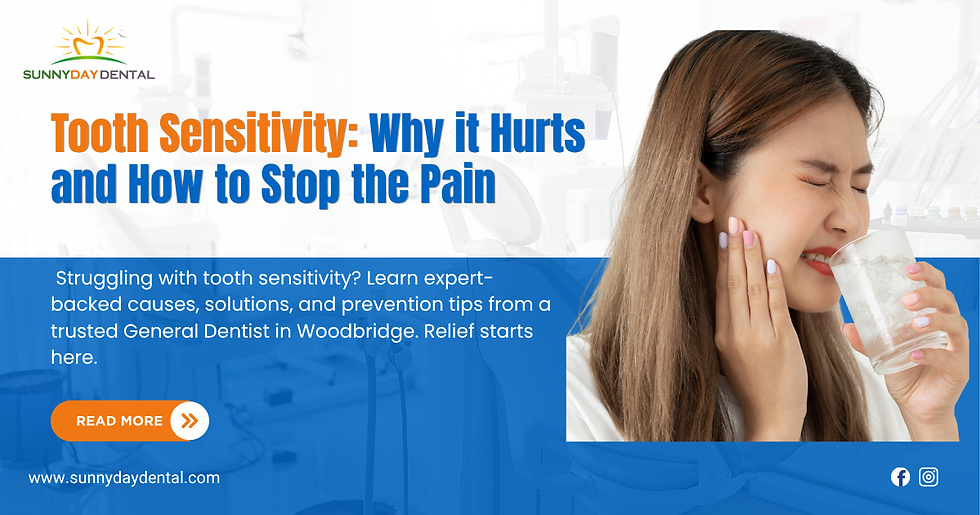What You Need to Know About Oral Cancer (From a Dentist’s View)
- Sunny Day Dental
- 4 days ago
- 3 min read

Oral cancer is a serious yet often overlooked condition affecting thousands of people every year. According to the American Cancer Society’s 2024 report, over 54,000 new cases are diagnosed annually in North America, with many detected late. As an experienced dentist in Woodbridge, I know that awareness and early detection save lives. This blog is your go-to guide on identifying, preventing, and managing oral cancer effectively.
What Is Oral Cancer?
Oral cancer occurs when abnormal cells develop in the mouth, lips, tongue, gums, or throat. If untreated, it can spread to other parts of the body. Regular dental visits help catch early signs that you may not notice on your own. During a routine dental cleaning in Woodbridge, your dentist checks for unusual patches, lumps, or sores that may require further evaluation.
Oral Cancer Symptoms You Should Know
Identifying oral cancer symptoms early is crucial. Watch for:
Persistent mouth sores lasting over two weeks
Red or white patches inside the mouth
Difficulty chewing or swallowing
Numbness in the lips or tongue
Changes in your bite or loose teeth
These signs are often painless in the beginning, making regular dental checkups vital for timely detection.
Mouth Cancer Early Signs to Look For
Some mouth cancer early signs can appear subtle but shouldn’t be ignored:
Rough or thickened areas on gums or cheeks
Small lumps inside the mouth
Chronic sore throat or voice changes
Unexplained bleeding without visible cause
If you spot any of these signs, book an appointment with a dentist in Woodbridge immediately. Early detection increases the success rate of treatment.
Key Risk Factors for Oral Cancer
Tobacco use in any form
Excessive alcohol consumption
Human papillomavirus (HPV) infection
Prolonged sun exposure to lips
Poor nutrition and weakened immunity
Your dentist can guide you on reducing these risks and maintaining oral health.
How Dentists Detect Oral Cancer Early
Dentists play a major role in identifying oral cancer during regular visits. At every dental cleaning in Woodbridge, dentists conduct an oral screening to check for abnormal tissue changes. Modern diagnostic tools, such as fluorescence lights and brush biopsies, can detect early lesions, preventing cancer from spreading.
Preventing Oral Cancer: Expert Recommendations
Quit tobacco and limit alcohol intake
Use SPF lip balm outdoors
Maintain good oral hygiene daily
Eat a balanced, antioxidant-rich diet
Schedule dental exams twice a year for screenings
Quick Oral Cancer Facts
Early signs: Sores, lumps, red or white patches, swallowing difficulty
Major risks: Tobacco, alcohol, HPV, sun exposure
Prevention: Healthy habits and routine dental visits
Best action: Consult a dentist if symptoms persist beyond 2 weeks
Take Action with Sunny Day Dental
Your oral health is your first defense against serious conditions like oral cancer. At Sunny Day Dental, our expert dentist in Woodbridge offers thorough checkups and advanced oral cancer screenings during every visit. Book your appointment today at
FAQs
1. How often should I get screened for oral cancer?
Screenings should be done at least once a year during routine dental visits, or more frequently if you have risk factors like tobacco or alcohol use.
2. Can oral cancer be treated successfully if caught early?
Yes, when diagnosed in its early stages, treatment success rates are significantly higher, often involving minor surgery or targeted therapies.
3. Does poor oral hygiene lead to oral cancer?
While not a direct cause, poor hygiene can lead to chronic infections and inflammation, increasing susceptibility to oral cancer over time.
4. Are oral cancer symptoms always visible?
No, some cancers begin deep in tissues without visible signs. This makes professional dental screenings vital for early detection.
5. What daily habits lower the risk of oral cancer?
Avoiding tobacco, moderating alcohol, protecting lips from UV rays, eating nutrient-rich foods, and keeping up with dental visits all help reduce risk.




Comments